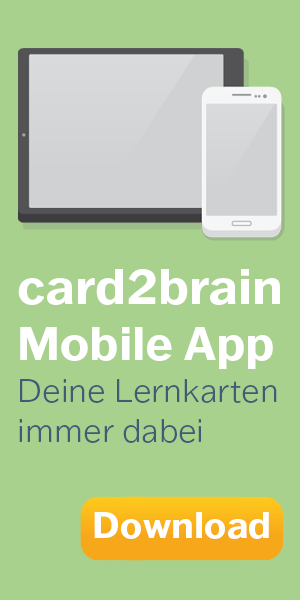-
Kartei Details
| Karten | 120 |
|---|---|
| Sprache | English |
| Kategorie | Psychologie |
| Stufe | Universität |
| Erstellt / Aktualisiert | 19.12.2017 / 22.12.2017 |
| Weblink |
https://card2brain.ch/cards/20171219_psychology
|
| Einbinden |
<iframe src="https://card2brain.ch/box/20171219_psychology/embed" width="780" height="150" scrolling="no" frameborder="0"></iframe>
|
Minimal Group Paradigm
Minimal conditions required for discrimination to occur between groups (Robber's Cave experiment)
Prejudice
Prejudgement (negative) towards a group
Discrimination
Negative action toward an individual as a result of one's membership in a particular group
Informational influence
If situation ambiguous, we look at others for clues (=> Elevator experiment)
Groupinfluence
Learning about positions of others strengthens/polarizes our own attitude
Social Loafing
Less effort by a person working together with a group
Conformity
Conforming to a group, eventhough we don't believe something. (=> Asch experiment)
Normative social influence
conform to feel good, to be accepted
information social influence
conform, because group is competent, has the correct information
Dissociative Amnesia
affects memory of traumatic event
unable to recall important personal information, forget autobiographical memories.
Dissociative Fugue
condition might be underdiagnosed
wander away, experience confusion about identity
2 - 4 days
depersonalization
outerbody experience
3rd person feelin, feel like in a fog/dream
Dissociative Identity Disorder
2 or more personalities
memory gaps for time of another identity ("why is my room destroyed?")
95% sexually/physicall abused as a child
Ingroup bias
discriminatory behavior prefering ingroup vs. outgroup
self-fulfilling prophecies
our expectation of a group influence how we treat them. (Example with gay applicant for job)
scapegoat theory
blaming outgroup, when ingroup experiences frustration/blocked from obtaining a goal.
How to tackle prejudice? (Allport)
Contact
Example instrumental aggression
Contract killer
Hostile aggression
feelings of anger
Diffusion of responsiblity
"I dont have to help, they should"
Pluralistic Ignorance
"If no one helps, maybe they don't need help"
Evaluation Apprehension
"I dont know how to help them"
neurodevelopmental disorders
developmental disorders, diagnosed in early childhood
Heritability ADHD
Prevalence in Childhood
73%
5%
Biological reasons for ADHD
Less activation in Frontal Love (Inhibit behaviour) performing mental tasks.
People with ADHD less Dopamine activity in Brain regions about motivation
Prosocial behavior
Intent to voluntarily help other people
Altruism
Helping others even if costs > benefits
Empathy
capacity to understand another person's perspective
Most important factors
proximity
similarity
(equal) physically attractive/social desireable
Social Exchange theory
Positive benefits > negative costs
Psychological disorder
Disturbance in our cognition, emotion regulation and behaviour
atypical, enough to deviate from cultural norm, harmful dysfunciton, stopping something we usually do
Prevalence Personality Disorder
9%
Personality Disorders most common/problematic?
avoidant and schizoid most common
borderline, antisocial most problematic
Paranoid Personality Disorder
pervasive, injustifiable, suspicious
schizoid personality disorder
lack of interest to form relationships
emotional cold, no friends
schizotypal personality disorder
suspicion, paranoia, weird
innappropriate emotions
antisocial personality disorder
continuously violating rights of others
often lying, fighting, impulsive
lack of remorse
18+ years
Histrionic
excessively, overdramatic, theatrical
uncomfortable if not in centre
narcisstic
overinflated, unjustified sense of self-importance
preoccupied with fantasies of success
taking advantage of others
borderline
unstable in self-image, mood, behaviour
cannot be alone
reckless / Impulsive












